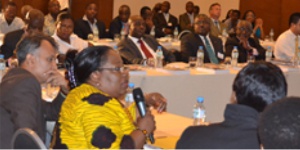Captains of industry and policymakers will tomorrow converge in Accra for the second edition of the Ghana Economic Forum (GEF) to deliberate on key issues affecting the country’s economic fortunes. This year’s edition, which is organised by the Business and Financial Times (B&FT), is under the theme “The Role of Leadership in Driving National Economic Prosperity”. Panellists at this year’s forum will discuss the topic “What Kind of Leadership Does Ghana Need to Maximise Her True Economic Potential”.
Speakers expected at the forum include: Professor Kwaku Atuahene-Gima, CEIBS Africa Programme; Mr. Kofi Amoabeng, CEO of UT Bank; Mr. Edward Boateng, Executive Chairman, Global Media Alliance; and Ms. Esther Cobbah, CEO Stratcomm Africa Speaking to the Business and Financial Times ahead of this year’s edition of the GEF, Mr. Dolapo Ogundimu, Managing Director of Access Bank, lead sponsors of the event said: “we believe in creating value for the local communities in which our bank operates. Our underlying philosophy of sustainable business practices means, we give back to the society; and what better way than to invest in generating ideas for the advancement of the economy, and society at large, than through partnerships like this one.
“The concept of the Ghana Economic Forum resonates with Access bank’s core value of leadership and setting standards for sustainable business practices. Quality leadership is key to the successful management of any form of human resource.”
Mr. Ogundimu, who is also a keynote speaker at the event, said Access Bank is committed to delivering long-term benefits to the Ghanaian economy -- explaining that the bank invested in big ticket transactions in both the private and public sectors of the economy in 2012 and is poised to do even more this year.
Mr. Martin Ofori, Acting Managing Director of first Atlantic Bank, told the B&FT in an interview that “we are in a period of economic transformation. We have just witnessed a game changer – oil -- in the economy. It can dramatically transform the economy. This requires visionary, transformational leadership to harness this and put it together to get us where we want to go.
“The concept of the Ghana Economic Forum (GEF) is a good one as it provides the platform for discussion of policy, and people who are affected by the policy get the chance to contribute to policy at the formulation stage. It brings on-board the views and expectations of economic agents into policymaking right at the formulation stage, so that it will better inform the objective, implementation and the evaluation of the policy.
The International Monetary Fund (IMF) expects Ghana’s economic growth to be 7.8 percent this year; and Government has promised an average of 8 percent per annum between 2013-16, with inflation below 10 percent.
Civil society groups have therefore called for transparency and accountability to guarantee that revenue accruing from oil and gas resources are used for the benefit of the populace.
This is what informed the creation of this unique platform to build the capacity of the current crop of leaders as well as address the leadership challenges the country faces.
Business News of Monday, 11 March 2013
Source: B&FT

















